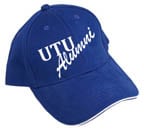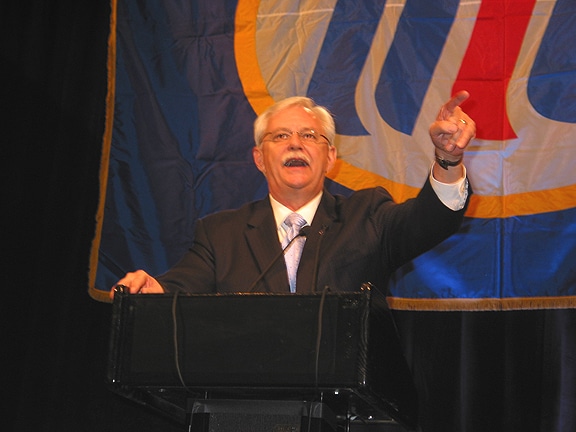Wall Street may be in a devastating financial free fall, but UTU finances are solid and growing.
That’s the conclusion of the two UTU International officers responsible for UTU finances.
“I asked for a thorough review of our finances after hearing that mischief makers are deceiving some UTU members that the UTU is in financial difficulty,” said UTU International President Mike Futhey.
“These unscrupulous individuals are spreading a vicious, unfounded deception that if the UTU doesn’t merge with the Sheet Metal Workers International Association immediately, the UTU is facing financial failure,” Futhey said. “This is a continuation of the misinformation that a federal court found with the previous administration.”
Assistant President Arty Martin said, “While UTU finances have been, and continue to be, strong, our evidence is that the SMWIA has a hand in the spreading of these false rumors about UTU finances.”
The SMWIA merger is on hold by order of a federal district court, which found that the previous administration failed to make UTU members aware of conflicts between the existing UTU constitution and the SMWIA constitution prior to seeking a ratification vote.
The court said that “absent information about the possible changes to their own governing document, the UTU members’ votes cannot be said to be meaningful.”
Moreover, the UTU membership was given incorrect information as to why the previous administration sought the merger. Recall that the attempted merger between the UTU and the SMWIA was predicated on severe UTU financial problems.
“When Arty Martin, Kim Thompson and I took office Jan. 1, and gained access to the books, it became apparent that UTU finances were not as dire as had previously and wrongfully been presented to us and our members,” Futhey said. “And as a result of our financial stance taken, UTU finances have continued to improve since taking office on Jan. 1.”
Of the current false rumor being spread about UTU finances, UTU General Secretary and Treasurer Kim Thompson said, “This is the same outrageous, incorrect and irresponsible allegation that was made by the previous UTU International president when he attempted his merger cram-down last year. The allegation was wrong then. The allegation is even more wrong today.”
The UTU’s executive director of finance, Stu Collins — who shares with the GS&T a legal and ethical responsibility to provide accurate financial reports — said, “Aggressive budget monitoring has improved the International’s funds by 50 percent since Jan. 1. The general fund, alone, has increased by more than 85 percent this year,” Collins said.
One example provided by Kim Thompson is the UTU convention fund. “The previous administration said we had been wiped out by the 2007 convention. In fact, more than $1 million in the convention fund went unspent.”
Said Kim Thompson: “Action taken by delegates to the 2007 convention mandated the GS&T prepare an annual budget for the operation of the UTU.
“The budget President Futhey, Assistant President Martin and I prepared for 2008 was developed with a goal of improving the reserves of the International funds by 50 percent by year end,” Kim Thompson said. “Within just the first eight months of 2008, we have accomplished that goal — and our funds continue to grow.
“Every effort is being made to put International funds to the best use for the membership — the most bang for the buck,” Kim Thompson said. “We are improving our financial situation as we deliver more to the membership.
“Since the Futhey administration took office, we negotiated a new national agreement with substantial back pay, we have stepped up organizing efforts in the rail and bus departments, and we have begun a training program for our local, general committee and state legislative officers through the UTU University,” Kim Thompson said.
“Within the UTU International headquarters operation, we have improved office productivity by ending the war that was started against International employees and their own union by the previous administration,” Kim Thompson said.
“Natural attrition has helped us cut costs,” Kim Thompson said. “At the International-officer level, we are doing more with fewer International vice presidents by utilizing each of them in the most cost-effective manner, including reduced travel budgets.”
UTU Executive Director of Finance Stu Collins said, “We remain on track to exceed the goals of the 2008 budget. The general fund has increased since Jan. 1 from $1.8 million to $3.9 million. Total International funds have increased from $7.6 million to $11.3 million, since Jan.
“Even the Discipline Income Protection Fund, which previously had difficulties, now exceeds expenses by $572,000, which is a tremendous turnaround since 2007,” Collins said.
“As for our union assets that are invested, they are invested primarily in cash accounts and short term bonds, and are largely unaffected by the stock market problems,” Kim Thompson said.
“As for the UTU Insurance Association, it has assets — like those of all insurance providers, and even the Railroad Retirement Trust Fund — invested in the stock market, as well as in bonds and cash accounts, but the UTUIA investments are generally conservative in nature,” Kim Thompson said.

